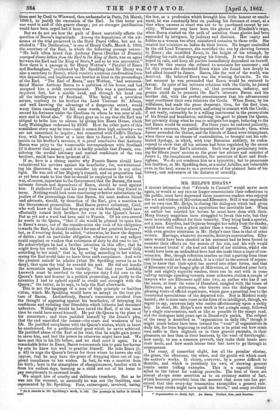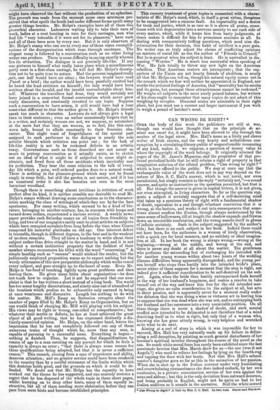MR. HELPS'S ESSAYS.*
A SLIGHT intimation that "Friends in Council" would never meet again, or would at any rate no longer communicate their reflections to the public, must have depressed those numerous readers who enjoyed the wit and wisdom of Milverton and Ellesmere. Still it was impossible not to own that Mr. Helps, in closing the dialogues which had given so much pleasure, yielded to a mysterious but inevitable lay. When an author has married his heroes he must have done with them. Many literary magicians have struggled to break this rule, but they have invariably suffered for their temerity. They bring back a spectre, not a man. Eurydice, had Orpheus brought her safely from the shades, would have still been a ghost rather than a woman. This law tells with even greater strictness in Mr. Helps's case than in that of other writers. Marriage, whatever its merits, destroys conversation. Elles- mere would have been checked in his sarcasms had he been forced to consider their effects on the morals of his son, and his wife would have seemed brutal if she had not talked of her children, whilst she would have been an undoubted bore had she inade them a topic of con- versation. Bat, though reflection teaches us that a parting from these old friends could not be avoided, it is a relief to the sorrow of separa- tion to know that their spirit has moved into other forms, and that if Ellesmere will no longer gibe at Milverton, or Dunsford pour forth mild and slightly soporific wisdom, there can be met with in. some railway carriage speeding towards some unknown station a couple of lawyers who are Ellesmere split into two, an author who has if not the name, at least the voice of Dunsford, mingled with the tones of 14/1ilverton, and a statesman, who throws into the dialogue those pleasing traits of official experience, which gave a practical hue to the theoretical speculations of the departed trio. Nor is Mildred really buried; she is risen once more in the form of an intelligent, though, we regret to say, careworn lady who smiles affectionately upon a sickly boy. In short, Mr. Helps's new work is but a single essay, followed by a single conversation, each as like as possible to the essays read, and the dialogues held years ago in Dunsford's parish. The subject of the essay is described as "organization in daily life," though it might much better have been termed the "want" of organization in daily life, for from beginning to end its aim is to point out how much men suffer in their slightest as in their gravest pursuits, in their pleasures no less than in their business, by the want of forethought : how rarely, to use a common proverb, they make their heads save their heels, and how much labour their feet have to go through in consequence.
The essay, if somewhat slight, has all the peculiar charms, the grace, the clearness, the sense, and the gentle wit which mark the author's works. It shines, moreover, by a power difficult to describe, and which is peculiarly his own, of showing general truths under trilling examples. This is a capacity closely allied to the talent for making proverbs. The best of these are almost always some assertion as to an ordinary matter of fact, which becomes proverbial from the moment that some one has per- ceived that this every-day transaction exemplifies a general rule. "Too many cooks might have spoilt the broth," and many scullions
• Organisation is Daily Life. As Essay. Parker, Son, and Bourne. might have observed the fact without the production of an aphorism. The proverb was made from the moment some ones acuteness per- ceiveil that what spoilt the broth had under different forms spoilt many greater things besides. Mr. Helps's examples have all of them this proverbial character. Labourers waiting idly to take their turn of work, ladies at a rout hunting in vain for their carriages, men who find life "very tolerable if it were not for its pleasures,' have each and all of them been seen by every one. But it is only observers of Mr. Helps's stamp who can see in every one of these cases exemplifi- cations of the disorganization which runs through existence. The elegant essay is followed by a conversation such as no other living writer can produce. There is some difficulty in saying exactly wherein lies its attraction. The dialogue is not precisely life-like. If any one pictures to himself what really takes place when a miscellaneous party meet in a first-class carriage, he will feel Mr. Helps's descrip- tion not to be quite true to nature. Had the persons imagined really pet, one half would have sat silent ; the lawyers would have read Punch or a brief; the author would have been painfully excited had he heard the least criticism on himself; the Lady would have been anxious about the invalid, and the invalid uncomfortable about him- self. Whatever the travellers had done, they would certainly not have joined in a somewhat formal conversation which never grew really _discursive, and constantly reverted to one topic. Suppose such a conversation to have arisen, it still would have had a tone somewhat different to that the author gives it. Mr. Helps's friends speak too much in character. Lawyers do not always give a legal turn to their sentences ; even an author occasionally forgets that he is a writer, and certainly women are not, we suppose, so astonished at the mere fact that they are women, as to feel, like this care- worn lady, bound to allude constantly to their feminine cha- racter. This slight want of forgetfulness of the special part assigned to each performer in the dialogue is nearly the sole artistic blemish which criticism can point out ; for the lack of life-like reality is not to be reckoned defects in an artistic essay. Conversations such as those described are not meant so much to portray conversation as it actually exists, as to sketch out an ideal of what it might be if subjected to some slight re- straints, and freed from all those accidents which inevitably mar its perfection. They bear the same relation to the talk of every- day life which a prim, well-ordered garden does to a natural wood. There is nothing in the pleasure-ground which may not be found singly in some field; but still the garden is not nature, and if it has an unnatural order it also has beauties not seen in the most luxuriant woodland.
Though there is something almost invidious in criticism of work perfect after its kind, it is neither possible nor desirable to read Mr. Helps's essays without drawing some conclusions as to the character- istics marking the class of writinks of which they are by far the best specimens. For essay writing, which seemed to be a kind of lite- rature belonging to another century, has, in common with hoops and turned-down-collars, experienced a curious revival. A weekly news- paper provides each Saturday essays on all topics from friendship to lying, and two of our magazines rarely omit to print articles on subjects which have occupied moralists from long before the time when Cicero composed his immortal platitudes on old age. One inherent defect is traceable, though in different degrees, in the best and in the weakest of modern essayists. They all have a tendency to write about their subject rather than drive straight to the matter in hand, and it is not without a certain instinctive propriety that the feeblest of their number always commences his titles with the word "concerning." I simple heading such as "success" would mislead the reader, but the judiciously employed preposition warns us to expect nothing but the wordy utterances of this new peripatetic philosophy which walks round every subject, and goes straight up to the heart of none. Even Mr. Helps is too fond of touching lightly upon great problems and then leaving them. He gives many hints about organization—he does not teach how to organize. Let it not be supposed that our com- plaint is that he has written a short instead of a long book. The world has too many lengthy dissertations, and ninety-nine out of a hundred of the treatises which profess to be exhaustive only succeed in being at once wearisome and discursive. Length has nothing to do with the matter. Mr. Mill's Essay on Secession occupies about the number of pages filled by Mr. Helps's Essay on Organization, but no one would think of charging Mr. Mill with playing with his subject. His views may be right or wrong, one-sided or comprehensive ; but whatever their merits or defects, he has at least achieved the great object of all good writing, that he has expressed distinctly a dis- tinctly-conceived opinion. Mr. Helps, on the other hand, leaves the impression that he has not completely followed out any of those numerous trains of thought which he, more than any man, is capable of pursuing to a successful issue. Everything is begun— nothing is finished. Thus, he suggests, that disqualifications by reason of age to a man entering on any pursuit for which he feels a capacity is always an error ; "that there is always some reason for these qualifications being adopted, but that it is never a sufficient reason." This remark, coming from a man of experience and ability, deserves attention; and no greater service could have been rendered to the country than by a careful statement of the limits within which this doctrine holds good, and the grounds on which it could be de- fended. We doubt not that Mr. Helps has the capacity to have worked out the theme he has suggested, and can scarcely restrain a regret that he has disposed of the whole topic in three short pages, whilst hurrying on to drop other hints, many of them equally in- structive, but all of them needing more elaboration before they can pass from mere hints and become established principles.
This cursory treatment of great topics is connected with a charac- teristic of Mr. Helps's mind, which, in itself a great virtue, threatens to be exaggerated into a ruinous fault. An impartiality and a desire for trut.li and justice, which is as rare as it is above all praise, some- times with him degenerates into a nervous anxiety to see each side of every matter, which, while it keeps him from hasty judgments, at times makes it difficult for him to pronounce sentence at all. In dealing with comparatively trilling questions, which need nice dis- crimination for their decision, this habit of intellect is a pure gain. No writer can so truly adjust the claims of conflicting opinions on matters of social life as can the author of "Friends in CounciL" But he is greatest when his subject is least. He is unrivalled in dis- cussing "Worries." He is much less successful when speaking of War. He fails totally to throw any new light on the Amencan rebellion. That American orators are intemperate ; that the sup- porters of the Union are not hearty friends of abolition, is nearly all that Mr. Helps can tell us, though his natural equity conies out in the remark which we fear will neither be appreciated in England, nor soothe the irritated feelings of America, that "neutrality has its merits and its gains, but amongst these attractiveness cannot be reckoned." He weighs all subjects in the most nicely poised balance, but writers of his class ought to remember that many topics do not admit of this weighing by scruples. Diamond scales are admirable in their right place, but you must use a coarser and larger instrument if you wish to weigh a pound of butcher's meat.































 Previous page
Previous page